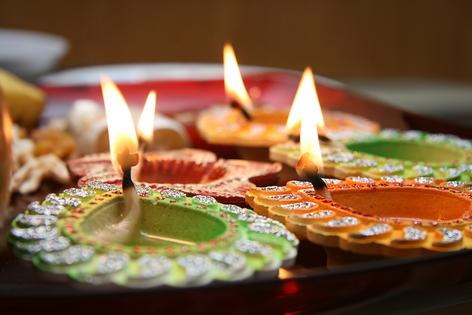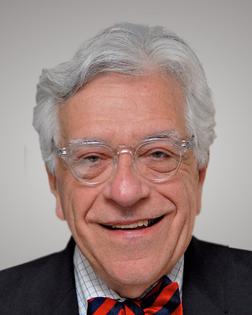The God Squad: Happy Diwali!
The major Hindu holiday of Diwali begins November 4. Diwali is a five-day holiday in honor of the goddess Lakshmi, who is in charge of wealth and prosperity. Diwali falls on the 15th day of Kartik, which is the holiest Hindu month. Hinduism, like Judaism, has a luni-solar calendar, which equalizes the lunar calendar with the solar calendar so that fall holidays always occur during the fall. Like Christmas, Diwali is marked by displays of colorful lights and bright holiday clothes, gift-giving and sweets. Everywhere in Hindu lands lamps, called diyas, are lit. Like our Fourth of July, it is celebrated (particularly on the third day of the holiday) with fireworks.
Diwali does differ from Western religious holidays in that it is not a celebration of a historical event that has been spiritualized. Christmas and Easter are celebrations of the birth and death and resurrection of Jesus in time. Passover is a celebration of the real exodus from the real Egypt in time. Ramadan is a celebration of the real pilgrimage of Mohammad from Mecca to Medina in time. In addition to these historical events that drive Western religious holidays, there is the cycle of natural time that is overlaid upon them, specifically the spring and fall harvest seasons and the winter solstice. Diwali is different. It is primarily a celebration of the Hindu goddess Lakshmi and also Lord Krishna who killed the demon Narakasura and defeated the god Indra who is the Hindu god of thunder and rain. These are spiritual not historical events recorded in Hindu scripture and legends. Because Diwali occurs every year in the late fall, it acts as a spiritual divider between the dry season and the monsoon season in India.
The message and hope of Diwali, as it is for New Year’s celebrations in the West, is for health and happiness and prosperity during the year ahead. Many Hindu merchants close their books for the year on Diwali. People give gifts of sweets (mithai) and gold. New clothes for the holiday are purchased.
The five days of Diwali are 1) Dhanteras (gift-giving day), 2) Chhoti Diwali “the small Diwali,” or Naraka Chaturolashi, when demon figures are burned, 3) Lakshmi puja also this is the New Moon (Amavasya) and is the day when fireworks and lamps (diyas) are lit, 4) Annakut which is the day (according to Northern India traditions) that Krishna defeated the god Indra, 5) Bhai Duj, this is my favorite Diwali day and custom. On this fifth day of Diwali, brothers travel to the household of their sisters to renew their bond of love. Such a sweet and bonding custom.
Every year I look back at my choices for topics and every year I slap myself for not writing more about the religions of the East. They represent a profoundly different approach to the search for spiritual wisdom than we see in the Abrahamic faiths of the West (Judaism, Christianity and Islam). The principal difference is that they challenge the belief in a single Creator God. There is a certain logic to polytheism. The world does indeed look like it has many different spiritual powers. Rivers seem to have a different origin than forests, and animals seem to derive their power from a different source than plants.
Seeing the world as filled with a multitude of gods, each with their own domain, can perhaps give us a broader and deeper reverence for nature than our biblical belief that an invisible God made the world, but that the world is not a part of God. I also admire the teaching of ahimsa, nonviolence to all living creatures. Although only about a third of all Hindus are vegetarians, there are more vegetarians in India than in any other country on Earth. Also, the West has embraced yoga and meditation which have origins in Hinduism. There is just so much to admire about our Hindu coreligionists.
With all this praise of the East, I am compelled to add my disagreements with the ancient Hindu caste system, called varnas, that divides Hindus from birth into four hereditary groups: Brahmins, Kshatriyas, Vaishyas, and Shudras. Below these four castes is the dalit, the untouchables who are the object of severe discrimination. It is true that beginning in 1948, Indian law prohibited discrimination based on caste but sadly, like racism in America, old habits of prejudice die hard. Both the Buddha and Gandhi saw the injustice of the caste system, and both were unable to overturn it.
The religion of Hinduism could not be more different than the religions of Judaism, Christianity, and Islam, but on this holiday of Diwali our common roots in light and joy is the one message we all share.
Happy Diwali!
(Send ALL QUESTIONS AND COMMENTS to The God Squad via email at godsquadquestion@aol.com. Rabbi Gellman is the author of several books, including “Religion for Dummies,” co-written with Fr. Tom Hartman.)
©2021 The God Squad. Distributed by Tribune Content Agency, LLC.
(c) 2021 THE GOD SQUAD DISTRIBUTED BY TRIBUNE MEDIA SERVICES, INC.












Comments